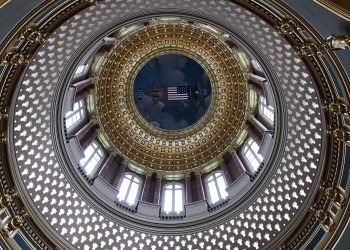DES MOINES, Iowa – Iowa’s Administrative Code is too large. That is the view held by State Rep. Jon Jacobsen, R-Council Bluffs, who sponsored HF 254, a regulatory rescission bill that advanced in subcommittee on Monday.
Dr. James Broughel, with the Mercatus Center at George Mason University, reported in 2020, the state had 161,000 regulatory restrictions in its administrative rules, as measured by instances of terms like “shall,” “must,” and “required.”
The average U.S. state has about 135,000 of these terms, and the least regulated state—Idaho—has just 39,000.
Jacobsen’s bill, co-sponsored by State Rep. Robert Bacon, R-Slater, would require for every new rule adopted by an executive agency, they will have to cut at least two regulations. The bill also provides for the review of new regulations by the Iowa Department of Management for approval.
“Regulation is choking small businesses. It’s choking large businesses,” Jacobsen told The Iowa Torch. “Many Americans are spending half their business days dotting i’s and crossing T’s to be spared the sword of Damocles, as they try to untie the Gordian knot of red tape.”
His bill is modeled after research done by the Mercatus Center. He noted several states had adopted rescission and the Trump Administration used the practice to chip away at rules and regulations at the federal level.
Jacobsen said he introduced this bill two years ago.
“I stacked up the whole I have a regulatory code on the committee table in the Supreme Court room,” he recalled. “By the time I stacked those up, I couldn’t even see across the table and look at Bruce Hunter.”
Jacobsen said there hadn’t been an incentive for executive agencies to do this.
“We’ve got some antiquated, obsolete regulatory provisions in the Iowa (Administrative) Code that need to be stricken, need to put a line through them. And the problem is, no one seems to really be incentivized to do this. They don’t see the light until they feel the heat. So we’re turning up the heat here,” he noted. “We’ve got to have some of the administrative agencies coming to the table with a pen in hand to strike through some of these old obsolete provisions.”
Jacobsen was unsure if the bill would survive funnel week this week. To move forward beyond this week, HF 254 needs to pass out of the Iowa House State Government Committee.
He said even if the bill doesn’t make it on the committee’s agenda this week, he expects an ad hoc committee to form to study specific deregulatory work that can be done in the state.
Jacobsen also told The Iowa Torch that bills don’t always need to pass to affect government. “I expect this is going to have a salient effect, one way or another.”
Recalling the debate over the election bill that passed in the Iowa House, he said he was amused when House Democrats complained about a potential $10,000 fine for county auditors by the Iowa Secretary of State’s office for technical violations, whether it was malicious or not.
“You could be fined in the banking industry without any malicious intent was just the equivalent of a scrivener’s error. You can be fined $100,000 a day for certain very minor filing issues. So we’ve got to get the burden off of the folks,” Jacobsen said. “President Trump showed how by moving aggressively with deregulating the red tape has allowed our businesses to flourish.”
Victoria Sinclair, the Government Relations Director with Iowans for Tax Relief, said the bill would improve Iowa’s business climate.
“The crux of the issue is that overregulation kills ingenuity and small business to such an extent that it stifles individuals’ ability to succeed. By taking a serious look at our state’s rules and considering the many that need to go, government bureaucracy may be thoughtfully shrunk to allow individuals to rise above the tangled mess of government regulations that presently make up Iowa’s administrative rules and achieve their full potential,” she told The Iowa Torch.
Drew Klein, the Iowa state director with Americans for Prosperity, told The Iowa Torch that this bill could have a positive long-term impact.
“The reality is it’s sometimes hard to pinpoint exactly which rules are most burdensome. Instead, an accumulation of rules stifle growth of businesses and often times stop the genesis of new businesses. I think it’ll have a positive long-term impact on the state of Iowa. The reality is unless we apply some sort of pressure to reduce the amount of administrative rules in the code, then it’s just not going to happen at the rate we would like it to,” he said.
The only group opposed to the legislation is the Iowa Chapter of the Sierra Club.
Read the bill below:
HF254Editor’s note: An earlier version of this story said this bill was based on model legislation offered by the Mercatus Center. The Mercatus Center is actually a 501(c)3 and does not offer model legislation. The story has been corrected, we regret the error.















